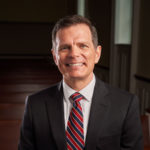
Hospitality
One of the lost and dying arts in the church these days is the practice of exercising hospitality. In days gone by people in church regularly planned to exercise hospitality on the Lord’s Day. They would plan ahead, invite people over for Sunday lunch, and fellowship with Christ’s people on the Lord’s Day—a foretaste of the eternal fellowship we will one day share. Families also used to prepare a sufficient amount of food so that they could invite visitors to the church over to lunch. In other words, the church regularly exercised and practiced hospitality.
Perhaps because Sabbath-observance is a dying conviction within the Reformed community, or maybe it’s our increasingly individualistic time in which we now live, fewer people and churches are exercising regular hospitality. Perhaps another contributing factor to this trend is that pastors don’t set a good example for their own congregations in this area. Or perhaps it’s because some churches are so big that pastors can’t possibly conceive of being able to show hospitality to the entire church. Regardless of the reasons, this shouldn’t be the present state of affairs in the church.A pastor’s relationship to his congregation must extend beyond preaching and one-on-one counseling. Click To Tweet
As a pastor, I had a small enough congregation that my wife and I were able to show hospitality to most everyone in our church. At the beginning of the year my wife and I would sit down with our church directory and plan to invite and host each household in the church for some sort of fellowship. Sometimes we served a weeknight dinner, Sunday lunch, or desert and coffee. Due to scheduling conflicts, there were some households we simply weren’t able to have over for a more intimate setting, but we were able to host them for a church-wide social event. I know of one pastor who told me that he and his wife hosted approximately 1,000 people per year from their church! We never hit such numbers, but we did manage to host most everyone in the church.
I was and am a firm believer in pastors exercising hospitality because it is a vital dimension of ministry. A pastor’s relationship to his congregation must extend beyond preaching and one-on-one counseling. A pastor will have a difficult time getting to know his sheep if the only time he sees them is on Sunday morning as he peers down upon them from the pulpit or when they visit him in his study for counseling. It is also important for a congregation to get to know their pastor. Hospitality is conducive to fellowship, and fellowship is conducive to building the bonds of unity within the church. Click To TweetI can say that my wife and I had numerous occasions to visit with members of the church because they invited us over for a meal. Hospitality is conducive to fellowship, and fellowship is conducive to building the bonds of unity within the church.
As a pastor, make hospitality a regular part of your ministry. Don’t be misled into thinking that you must be a great chef or serve a fantastic meal. While food is helpful, it is not essential to hospitality. When I was single, I would buy salad in a bag, a frozen lasagna, and a loaf of French bread, and voila, I had the means to invite someone over for a meal. On other occasions I simply bought some nice coffee and a fancy desert, and again, had the means to exercise some hospitality. If you have to, get a bag of chips and a six-pack of Coke, and you’ll be good to go. It’s not about the food, it’s about the fellowship. If churches don’t have a hospitality line-item in their budget for the pastor, they should consider adding one. This way, the pastor can afford to spend the extra money to feed the church (my colleague who fed 1,000 people per year had a line-item in his budget for it).
In the end, breaking bread with your church is one of the best ways to get to know them, serve them (literally), and show them your care and love.
This post was originally published on Dr. Fesko’s blog.

